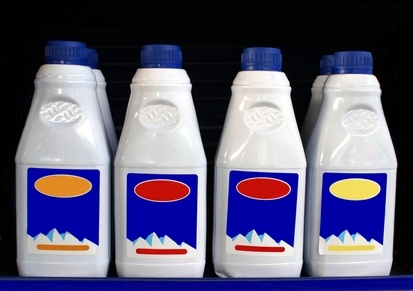
Antifreeze is defined as a substance that is added to a solvent in order to reduce its freezing point. Antifreeze is used in vehicles to prevent them from overheating due to the high temperatures associated with internal-combustion engines.
Antifreeze is a type of engine coolant that is stored in the radiator and coolant reservoir until the engine reaches a temperature high enough to open the thermostat. Once the thermostat opens up, it allows the antifreeze to cycle through the engine and keep it cool. At one atmosphere pressure, pure water boils at 212 degrees Fahrenheit, but a 50/50 blend of antifreeze and water boils at 223 degrees Fahrenheit. On the other side of the spectrum, antifreeze also keeps your engine's cooling system from freezing up in the winter months.
Antifreeze also possesses corrosion-resistant properties. It contains chemicals that inhibit scale formation within the engine, radiator and accompanying components like hoses and tubes.
Antifreeze can be bought either straight or in a 50/50 pre-diluted mixture with distilled water. A pre-diluted mixture is recommended for use in cold weather to avoid engine freeze-up, and also in hot weather to avoid premature coolant boiling. Antifreeze is not necessary in moderate temperatures, but it is recommended to avoid corrosion. There should never be more than 60-percent antifreeze in your coolant mixture.
The active ingredient in the majority of antifreeze is ethylene glycol, a substance produced from natural gas. There are manufacturers, however, that make antifreeze with propylene glycol instead, which is known to be safer for the environment and less toxic to humans, both in the long and short term.
Antifreeze contains hazardous chemicals that are dangerous for the environment as well as animals and humans. It is important to avoid spillage and to immediately clean up any spills that do occur. Used antifreeze should be stored in a closed container and disposed of as per your local regulations, or brought to an auto parts store that recycles engine coolant.